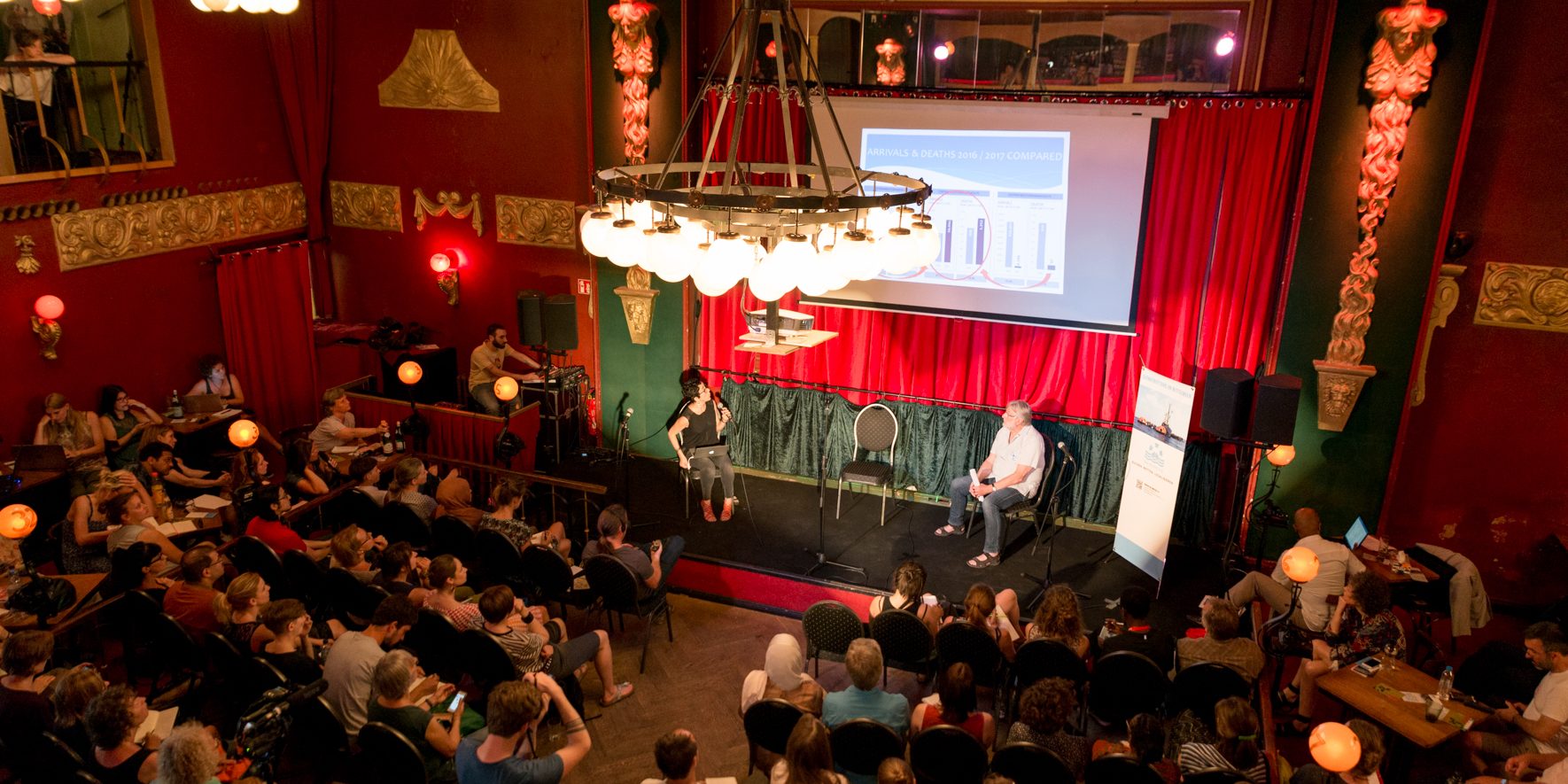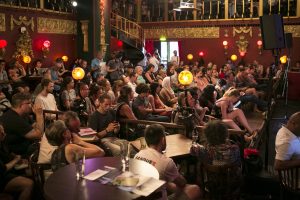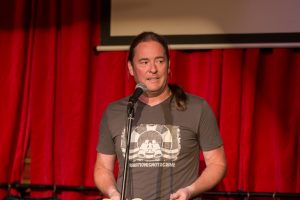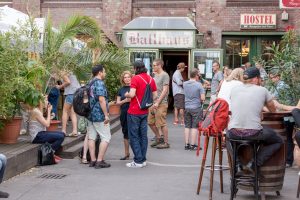It is not a crime to flee war, violence or poverty. To lend weight to this statement, Sea-Watch organised an open exchange of ideas in Berlin on World Refugee Day, 20th June 2017. Various guests brought their perspectives on the criminalisation of refugees and migrants to the podium. Contributions from leading experts in fields of theory and practice all led to a similar conclusion: the policy of the EU is leaving civil society in the lurch in terms of how refugees and migrants are provided for. In order to remedy this deficiency, a petition was started at the conference demanding that the German government make cooperation with the Libyan Coastguard contingent on clear human rights standards. Time and again, incidents were brought up in which members of this EU-financed Coastguard put the lives of refugees, migrants and rescuers in danger: https://sea-watch.org/en/petition-end-eu-financed-violence-against-refugees-and-migrants-by-the-libyan-coastguard/
During the press conference in the morning, Dr. Violeta Moreno-Lax, Lecturer in Asylum and Migration Law at Queen Mary’s University, London, commented on the accusations currently being levelled at SAR NGOs and the situation in Libya. Since Libya is recognised as a ‘Failed State’, even with the benefit of political will no Libyan government would be in a position to guarantee human rights. Correspondingly, Moreno-Lax criticised the European Union’s attempt to abdicate responsibility to the Libyan authorities. She supported Sea-Watch’s demands not only to end the current smear campaign but also to protect NGOs while carrying out their work, which is currently being hindered greatly by the so-called Libyan Coastguard.
At 2.00 p.m. the conference was officially opened by Sea-Watch CEO Axel Grafmanns, who condemned the current policies of criminalisation, isolation and externalisation. He emphasised that Europe bears some of the guilt for the causes of flight: “Criminalising flight, externalising borders and pushing them further away, building walls and fences and criminalising NGOs is a way of hiding from the responsibility for the pain and suffering which we too have partly caused around the world.”
In her subs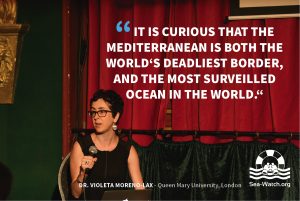 equent speech, Dr. Moreno-Lax shed further light on the situation in the Mediterranean and the consequences of the EU’s policies. “It is curious that the Mediterranean is both the world’s deadliest border, and the most surveilled ocean in the world.” Since the Italian rescue operation Mare Nostrum was ended and replaced by a joint operation of all EU member states, around 10 times fewer people have been saved by official efforts, as reflected in the higher death toll. This is all the more reprehensible as Europe is one of the wealthiest regions in the world and directly responsible for many causes of flight. Dr. Moreno-Lax also spoke out against the criminalisation of refugees and migrants. As there is currently no legal safe passage for asylum seekers who wish to make use of their legal right to asylum, all necessarily become “illegal immigrants”.
equent speech, Dr. Moreno-Lax shed further light on the situation in the Mediterranean and the consequences of the EU’s policies. “It is curious that the Mediterranean is both the world’s deadliest border, and the most surveilled ocean in the world.” Since the Italian rescue operation Mare Nostrum was ended and replaced by a joint operation of all EU member states, around 10 times fewer people have been saved by official efforts, as reflected in the higher death toll. This is all the more reprehensible as Europe is one of the wealthiest regions in the world and directly responsible for many causes of flight. Dr. Moreno-Lax also spoke out against the criminalisation of refugees and migrants. As there is currently no legal safe passage for asylum seekers who wish to make use of their legal right to asylum, all necessarily become “illegal immigrants”.
The next speaker, Stefan Schmidt, famous as the captain of the Cap Anamur, likewise criticised the criminalisation of rescuers, which he himself has experienced. After he brought shipwrecked refugees to an Italian harbour aboard his ship in 2004, he was incarcerated by the local authorities for a week and subsequently charged. He was only released five years later. Rescuing those in distress at sea is not only a moral duty, but a law. “The Cap Anamur was a political case…not a legal one”. He condemned cooperation with repressive regimes: “De Maiziere says: we have the refugee crisis in hand. The truth is: we are negotiating with dictators in Africa as if refugees are criminals from whom our borders must be protected”.
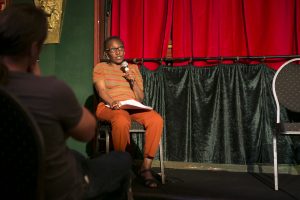 Elizabeth Ngari is the cofounder of the organisation Women in Exile, works for the empowerment by and of female refugees from a feminist perspective. Women who flee are especially in need of protection – and sadly the danger of sexual and physical violence all too often does not end when they reach a camp in Europe. In these cases, female refugees receive no support from the side of the German legal system. “They are told: ‘Come back if it happens again.’ The German government does not protect female refugees.” Ngari described the case of a woman from Eritrea who took her own life because she could not bear the situation any longer. According to Ngari, this violence is a direct consequence of the camp structures and racially-motivated asylum policies. Moderator Abdou Rahime Diallo asked that all participants rise for a shared moment of silence in conjunction with Ngari’s speech: “We should take the time to stand up for the rights of female refugees!”
Elizabeth Ngari is the cofounder of the organisation Women in Exile, works for the empowerment by and of female refugees from a feminist perspective. Women who flee are especially in need of protection – and sadly the danger of sexual and physical violence all too often does not end when they reach a camp in Europe. In these cases, female refugees receive no support from the side of the German legal system. “They are told: ‘Come back if it happens again.’ The German government does not protect female refugees.” Ngari described the case of a woman from Eritrea who took her own life because she could not bear the situation any longer. According to Ngari, this violence is a direct consequence of the camp structures and racially-motivated asylum policies. Moderator Abdou Rahime Diallo asked that all participants rise for a shared moment of silence in conjunction with Ngari’s speech: “We should take the time to stand up for the rights of female refugees!”
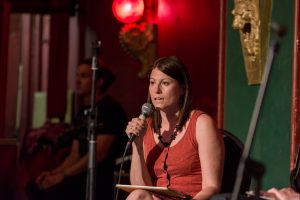 The next input came from Aurélie Ponthieu, a humanitarian specialist for flight and migration with the NGO Doctors Without Borders (MSF). She emphasised the structural dimension of the violence, and that the life-threatening situation in the Mediterranean was a conscious political decision. She explained that the EU was using crime-fighting vocabulary: “The EU is obsessed with a particular type of crime, with smugglers and traffickers. It doesn’t concern itself with violence committed by border guards and the mistreatment of refugees and migrants.” The danger of criminalisation and criminal prosecution is thus always present. Ponthieu also stressed that private aid workers and rescuers often have to suffer more state-based repression than members of a large NGO like Doctors Without Borders.
The next input came from Aurélie Ponthieu, a humanitarian specialist for flight and migration with the NGO Doctors Without Borders (MSF). She emphasised the structural dimension of the violence, and that the life-threatening situation in the Mediterranean was a conscious political decision. She explained that the EU was using crime-fighting vocabulary: “The EU is obsessed with a particular type of crime, with smugglers and traffickers. It doesn’t concern itself with violence committed by border guards and the mistreatment of refugees and migrants.” The danger of criminalisation and criminal prosecution is thus always present. Ponthieu also stressed that private aid workers and rescuers often have to suffer more state-based repression than members of a large NGO like Doctors Without Borders.
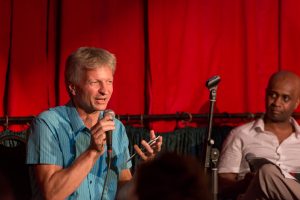 In the ensuing panel with Ponthieu and Frank Dörner, a board member and co-founder of Sea-Watch, the lack of political will to support maritime rescue initiatives in their work was again discussed. Dörner emphasised that NGOs often carry out the duties of states in this instance. “The people rescued from immediate distress at sea are often left alone on board Sea-Watch for days at a time – and that is intentional!” This can also be seen from the fact that the Sea-Watch reconnaissance aircraft Moonbird constantly sights unregistered boats, despite extensive use of the latest surveillance technology in the Mediterranean. Dörner demanded a state-based rescue system and legal safe passage, through which not only the dying could be ended but also the business of the traffickers would drop off immediately. When questioned, Ponthieu and Dörner both stressed that the situation in the Mediterranean was a consequence of structural racism. “When European lives are in danger, wheels are set in motion to rescue them. When migrants at sea are in danger, no-one is interested. A racist policy is quite clearly being carried out here,” said Dörner.
In the ensuing panel with Ponthieu and Frank Dörner, a board member and co-founder of Sea-Watch, the lack of political will to support maritime rescue initiatives in their work was again discussed. Dörner emphasised that NGOs often carry out the duties of states in this instance. “The people rescued from immediate distress at sea are often left alone on board Sea-Watch for days at a time – and that is intentional!” This can also be seen from the fact that the Sea-Watch reconnaissance aircraft Moonbird constantly sights unregistered boats, despite extensive use of the latest surveillance technology in the Mediterranean. Dörner demanded a state-based rescue system and legal safe passage, through which not only the dying could be ended but also the business of the traffickers would drop off immediately. When questioned, Ponthieu and Dörner both stressed that the situation in the Mediterranean was a consequence of structural racism. “When European lives are in danger, wheels are set in motion to rescue them. When migrants at sea are in danger, no-one is interested. A racist policy is quite clearly being carried out here,” said Dörner.
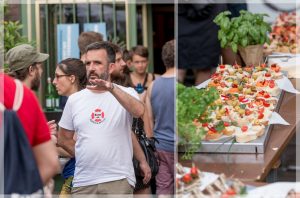 The room in the Ballhaus was packed from start to finish, and there were ample opportunities for networking amongst participants over food provided by an excellent solidarity catering. This multi-faceted conference brought together activists, academics and sailors from around the world, in order to consider and better understand flight from theoretical and practical perspectives. Yet one thing remains clear, even if it is not visible in the current political discourse: wherever people come from and wherever they are going, fleeing is not a crime.
The room in the Ballhaus was packed from start to finish, and there were ample opportunities for networking amongst participants over food provided by an excellent solidarity catering. This multi-faceted conference brought together activists, academics and sailors from around the world, in order to consider and better understand flight from theoretical and practical perspectives. Yet one thing remains clear, even if it is not visible in the current political discourse: wherever people come from and wherever they are going, fleeing is not a crime.
Report: E. Schaumanns
Photos: Lynn Zapp





